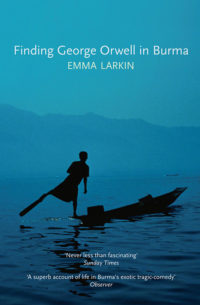Impossible to imagine the daily fear and precariousness of living in such a state
 Finding George Orwell in Burma
Finding George Orwell in Burma
by Emma Larkin
When I said I was reading Burmese Days by George Orwell a few people recommended I read this next. I started it almost immediately after the Orwell book, but it took me a while to get through. I agree that it’s a fantastic reference work, but is it a good read?
The title is a fairly good description of the book. Emma Larkin – the pseudonym of an American journalist living in Thailand who has travelled to Myanmar (which she tends to call Burma throughout) many times – used researching Orwell’s time in Burma as a structure (or perhaps an excuse) for her year-long travel across Myanmar, speaking to people there who remembered Orwell or British rule in general, but also to people willing to open up about life in Myanmar.
The first point that strikes me is that this book was first published (under a slightly different title) in 2004, and even this edition with an epilogue from 2011 is a little out of date already. While it’s extremely useful as a recent history, I was always aware while reading it that this probably isn’t the current state of affairs in Myanmar.
That said, it’s still an important and valuable piece of journalism. Larkin uses her unusual position as a Burmese-speaking foreigner to access people eager to be heard outside of their country, and has very varied experiences of trust or lack of it from them. There is above all a deep-seated fear of Myanmar’s military rulers and of the potential to be reported by a neighbour for even the most minor transgression – including speaking to a foreign journalist.
“For an outsider like myself, unable to see beyond the façade the generals have created, it was impossible to imagine the daily fear and precariousness of living in such a state. It was during my efforts to understand this aspect of Burmese life that I became fascinated by Orwell. All his novels explore the idea of individuals being trapped within their environment, controlled by their family, the society around them or an all-powerful government.”
Larkin’s route follows in order the places where Orwell lived during his five years working as a military policeman in British-ruled Burma. Through other sources and her own investigations, she reveals details about Orwell and the effect those five years had on him, as well as the history of the land and its current state (in 2004). In her introduction she acknowledges the tricky path she had set herself. She could not be in Myanmar as a journalist, only as a tourist or on business. So even her research into Orwell, while on the surface a harmless western curiosity, had to be kept under wraps. Almost all names in this book have been changed, and in some cases the people’s locations have been disguised.
Larkin’s premise is that Orwell didn’t only write about Burma in his first novel (the aforementioned Burmese Days) and the occasional essay; that Burma was also the source material for his most famous works Animal Farm and Nineteen Eighty Four. There are certainly plenty of clear parallels to be drawn, though Larkin acknowledges that they most closely reflect current-day Myanmar rather than the Burma that Orwell knew.
From the start it is clear that the Burmese people are afraid, but until the second half Larkin gives no details of what they are afraid of. Then she starts speaking to former political prisoners, to the families of current political prisoners, even to a former activist who has escaped across the border to Thailand. The details are horrific, and it is perhaps best that they were held back, until after Larkin has detailed some of Myanmar’s more positive traits – namely, its landscape.
Everywhere Larkin goes it is clear that a close watch is being kept on her. Local police question her or tell her to go back to her hotel. People are reluctant to take her anywhere without official permission, and some of her more remote visits can only be made by police escort. But even with this close scrutiny, she manages to meet secret poets and historians, nurture friendships and even hold an Orwell book club.
“I watched the well-rehearsed ballet of the printing press…A shirtless man wearing a labourer’s knee-length longyi worked the levers, and another man crouched beneath the machine to catch the printed pages as they came flying out…Ko Ye…flicked through the magazine and showed me where the censors had scrawled with a pink highlighter across certain paragraphs…Scribbled alongside each scrawl was the single word ‘hypoke’, or ‘remove’.
‘Why these particular pages?’ I asked.
‘I really don’t know,’ he replied. ‘I don’t think even the people at the censorship board know any more.’ ”
So why did it take me more than a month to read a 230-page book? Honestly, it was too dark and depressing to wholly immerse myself. I know that I choose to read such things to expand my knowledge of the world, so it’s odd to then flinch from what I expose myself to. But it’s very different to read about real people out there in the real world living in such a state of fear and lies. I’m glad to have learned about it, but I can’t say I enjoyed the experience, even with Larkin’s excellent writing.
Secret Histories: Finding George Orwell in a Burmese Teashop published 2004 by John Murray.
This version first published 2011 by Granta Books.
Source: Foyles.